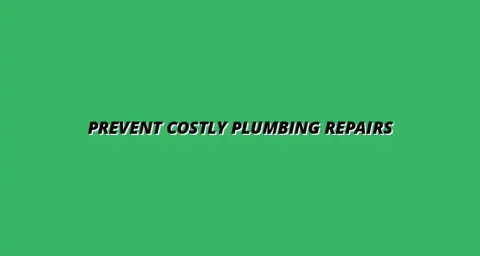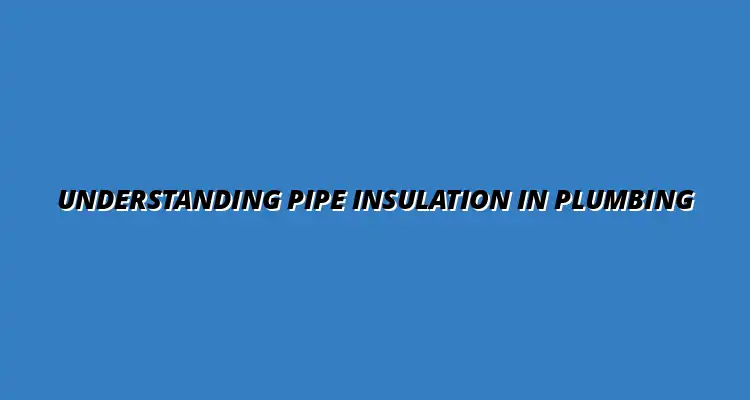
- Beginner Tips
- Feb 12
2025-02-14
Pipe insulation is an essential component of any plumbing system. It helps in maintaining the temperature of the water flowing through pipes and enhances the overall efficiency of the plumbing infrastructure. By understanding its significance, homeowners can make informed decisions about their plumbing needs. For more tips on general plumbing system maintenance, check out this helpful guide: tips for plumbing system maintenance.
Pipe insulation refers to the materials used to coat pipes to minimize heat loss or gain. This can protect both hot and cold water pipes, ensuring the temperature of the water remains stable. It also acts as a safeguard against potential damage caused by temperature fluctuations.
Insulation works by creating a barrier between the outside environment and the pipes. This barrier prevents heat transfer, keeping hot water hot and cold water cold. By doing this, pipe insulation helps maintain efficient energy use and reduces the workload on heating and cooling systems.
One of the primary benefits of proper pipe insulation is improved energy efficiency. By reducing heat loss, homes can save significantly on energy bills. This means that over time, the investment in pipe insulation pays for itself through lower utility costs.
In areas with cold climates, pipe insulation is crucial for preventing pipes from freezing. Frozen pipes can lead to severe water damage and costly repairs. Learning to identify and fix leaky pipes can save you a lot of trouble down the line. Check out this guide: identify and fix leaky pipes. Insulating pipes ensures that they remain warm enough to withstand freezing temperatures.
Proper insulation also helps control condensation on pipes, which can lead to mold growth. By regulating temperature and minimizing moisture, you reduce the risk of mold and mildew in your home. This not only keeps your plumbing in good shape but also promotes a healthier living environment.
Fiberglass insulation is one of the most popular options. It's lightweight, effective, and comes in various thicknesses. This type of insulation works well for both hot and cold pipes, providing excellent temperature control.
Foam insulation is another effective choice. It's flexible and easy to install, making it suitable for various pipe sizes. Foam insulation not only prevents heat loss but also adds a layer of protection against accidental impacts.
Mineral wool insulation offers fire resistance along with thermal insulation. It’s a bit heavier than other options but provides excellent protection. Other options may include reflective insulation, which is particularly effective in reducing heat gain in warm climates.
Your local climate significantly impacts the type of pipe insulation you should choose. In warmer regions, a lighter insulation may suffice, while colder areas require thicker, more robust insulation to prevent freezing. Understanding your environment is key to making the right choice.
It's crucial to consider the material of your pipes when selecting insulation. Different insulation types work better with specific pipe materials, such as copper, PVC, or PEX. Ensuring compatibility enhances insulation performance and longevity.
The choice between residential and commercial plumbing applications can affect your insulation decisions. Commercial plumbing systems may require more robust insulation due to higher usage and varying temperatures. Residential systems, while still needing insulation, might have different requirements based on usage and pipe layout.
To properly insulate your pipes, you'll need some basic tools and materials. Essential tools typically include a utility knife, measuring tape, and adhesive. For materials, you can choose from fiberglass, foam tubes, or mineral wool insulation. Regular maintenance of your pipe insulation is key to its longevity. Learn more about the benefits here: regular pipe insulation maintenance benefits.
Some common mistakes can hinder the effectiveness of your insulation. One major error is not ensuring a tight fit, which can result in gaps. Additionally, using the wrong type of insulation for your pipes can lead to inefficiencies, so always double-check compatibility.
The cost of pipe insulation can vary widely based on the type of material and the project size. On average, it can range from a few cents per linear foot for foam insulation to more for specialty materials. It's wise to get a few quotes to find the best match for your budget.
Absolutely! You can add insulation to existing plumbing, which is a smart decision if you want to improve energy efficiency. Just ensure you choose the right materials and methods suitable for the current pipe setup.
Yes, many homeowners can install pipe insulation as a DIY project. It’s generally straightforward and doesn’t require advanced skills. If you're tackling a DIY plumbing project, fixing a leaky faucet is a common one. Here's a step-by-step guide: fix a leaky faucet in steps. Just make sure you follow guidelines and take necessary safety precautions while working!
Pipe insulation plays a crucial role in increasing the longevity of plumbing systems. By providing a protective barrier, insulation helps prevent rust and corrosion that can occur due to temperature fluctuations. This means that less frequent replacements are needed, saving you both time and money in the long run! Preventing corrosion in your water heater pipes is especially important. For tips, visit: preventing corrosion in water heater pipes.
Additionally, when pipes are insulated, they maintain a consistent temperature, reducing the stress on the materials. This stability can significantly lower the chances of leaks or bursting, especially in extreme weather conditions. In short, properly insulated pipes can last longer and perform better!
No one enjoys the sound of pipes rattling or banging, especially when you're trying to relax at home. Insulating pipes can significantly reduce these noises by dampening vibrations that occur during water flow. The insulation material absorbs sound, providing a quieter living environment.
Pipe insulation is not just beneficial for your plumbing; it also positively impacts the environment. By maintaining the temperature of hot water and keeping cold water cold, insulation reduces energy consumption. This efficiency means less energy is needed to heat or cool water, leading to lower utility bills!
Over time, this reduced energy use contributes to a smaller carbon footprint, which is essential for our planet's health. Insulating your pipes is a simple step you can take toward a more sustainable lifestyle.
In today's world, sustainability is more important than ever. When selecting pipe insulation, consider materials that are eco-friendly. Options include recycled fiberglass, cellulose, and even natural fibers like wool!
Choosing these materials not only helps the environment but also supports a growing market for sustainable products.
The field of pipe insulation is constantly evolving, with new technologies emerging to improve efficiency and performance. For example, some innovative products now have built-in sensors that monitor temperature changes and alert homeowners to potential issues. This can be a game-changer in preventing costly water damage!
Moreover, advancements in insulation materials have led to thinner yet more effective options, which save space without sacrificing performance. These trends show that the future of pipe insulation is focused on smart solutions and efficiency.
As technology advances, we can expect to see even more improvements in pipe insulation practices. Future innovations may include self-regulating systems that adjust insulation properties based on environmental conditions. This could lead to even greater energy savings and improved system performance.
Additionally, building codes are becoming stricter, and many areas are now requiring better insulation for plumbing systems. This means that homeowners and businesses will increasingly need to invest in high-quality insulation to stay compliant and efficient!
To ensure your pipe insulation continues to perform well, regular checks and maintenance are essential. Inspect your insulation for any signs of wear, damage, or moisture buildup at least once a year. This proactive approach can catch problems before they escalate!
By staying vigilant, you can ensure that your plumbing system remains efficient and effective over the long term. For help with more complex plumbing issues, consider contacting a local plumber. For example, if you need a plumber in Billesley, Birmingham, you can find one here: plumber in Billesley, Birmingham.
While DIY projects can be rewarding, some homeowners might find it more beneficial to seek professional help for pipe insulation. If you're unsure about the best materials to use or need assistance with installation, don’t hesitate to call in the experts. They can provide valuable insights and ensure that the job is done correctly!
Additionally, professionals can offer maintenance services and can help set up a regular inspection schedule. This support can further extend the lifespan of your plumbing system and maximize the benefits of insulation.
In conclusion, pipe insulation is a key component of any plumbing system. It enhances durability, minimizes noise, and contributes to energy efficiency. By prioritizing proper insulation, homeowners can save money, reduce environmental impact, and enjoy a more comfortable living space!
Now is the perfect time to assess your plumbing system and consider the benefits of insulation. Whether you're building a new home or upgrading your current system, make insulation a priority. You'll reap the rewards of lower energy bills, extended pipe lifespan, and a quieter home.
So, take action today! Your plumbing system—and the planet—will thank you!
